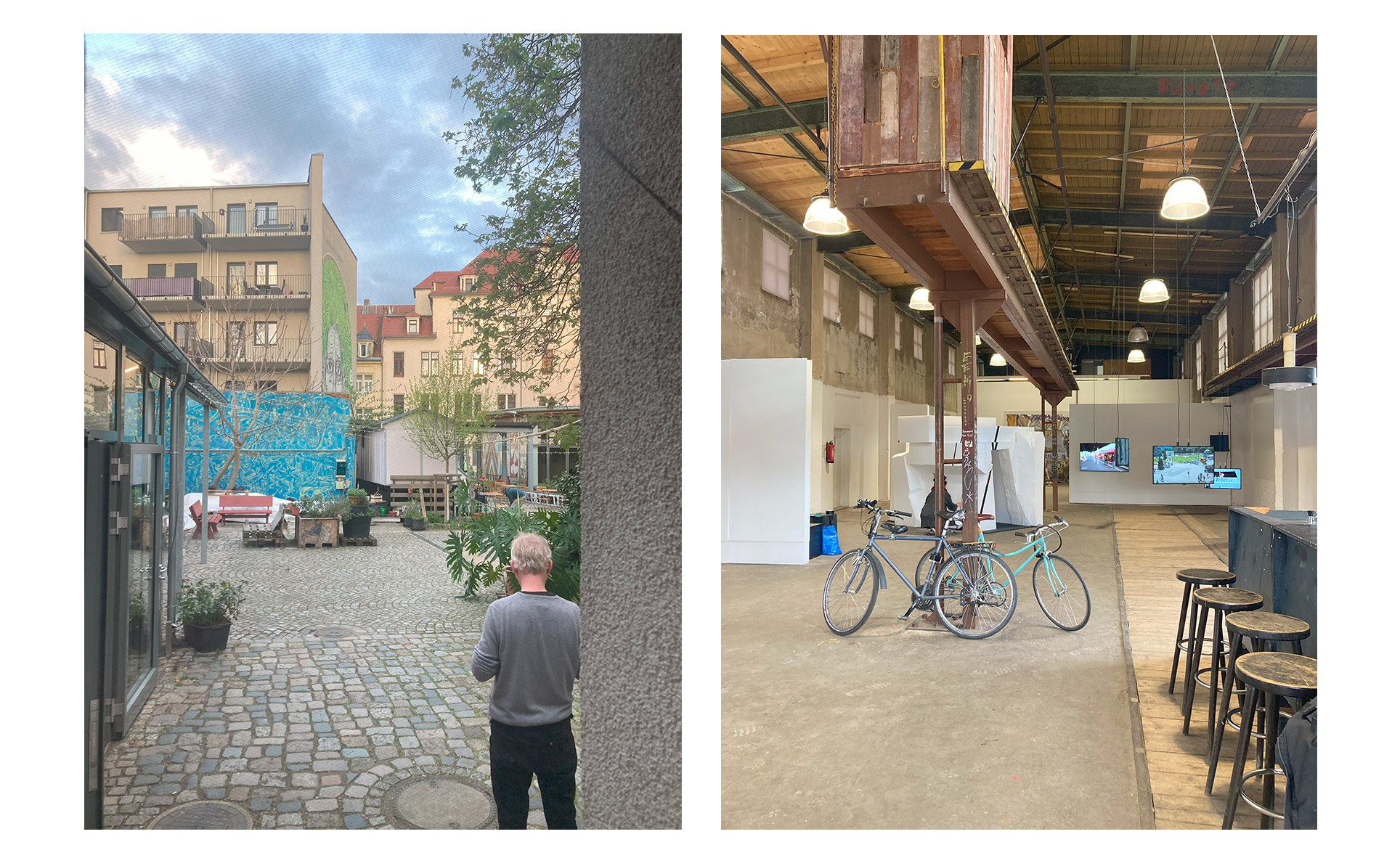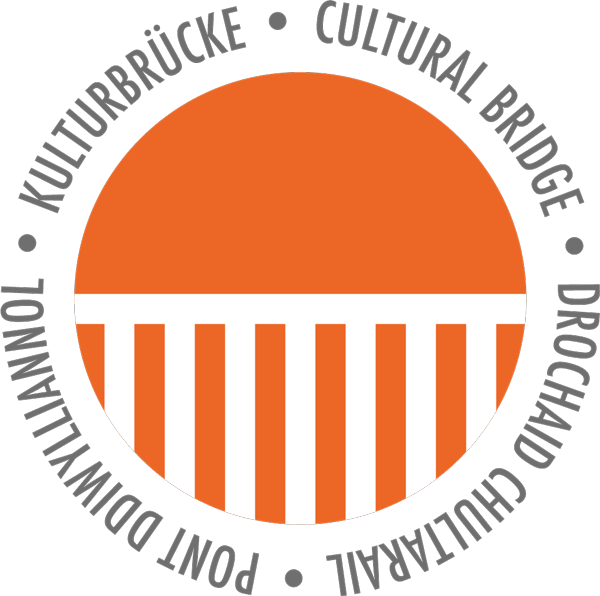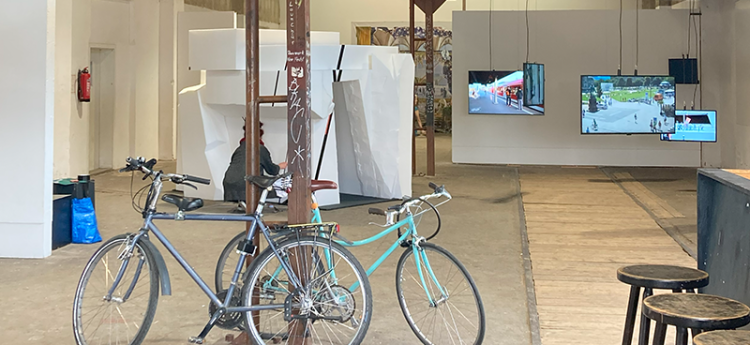SET x riesa efau x Videocity Exchange Trip, 24-30 April 2023
In April 2023, Ellie Dobbs, Curator at SET, along with Roland, Founding Director of SET, and Jemima Thomas, Director of Studios, successfully completed the first part of an exchange programme with our partners at riesa efau Dresden. This exchange, facilitated by Cultural Bridge, began in February and has brought together SET, riesa efau, and the artist-curator network Videocity, allowing us to share our approaches to supporting artists and communities through a series of regular Zoom calls. The discussions have ranged from socially-engaged programming approaches and the challenges of DIY spaces to strategies for the future of our work. The next phase of the programme involves riesa efau and Videocity visiting SET in October 2023. SET would like to take this opportunity to highlight the significant learnings, exchange of ideas, and transformative impact of this partnership thus far. Reflecting on our exchange, we will discuss our shared efforts in supporting grassroots creativity and gaining new perspectives.

Images: Left, riesa efau. Right, GEH8 Space is the Place Exhibition View
After touring riesa efau’s extensive network of buildings and galleries we were particularly impressed by their commitment to accessibility and community engagement, which was evident through their provision of affordable drop-in workshops and their excellent communal facilities. Each week, riesa efau offers a wide range of creative activities, including ceramics, lithography, printmaking, photography, and even an electrical repair workshop, all at affordable rates. This initiative not only demonstrates their dedication to making art accessible but also inspired SET to extend our own offerings, as facilities are often difficult to incorporate into meanwhile-use studio sites. Following our trip, we decided to partner with Art Hub, a nearby studio provider in Woolwich, to offer a facilities swap. Art Hub generously provided discounted access to their printmaking and ceramics studios and we also ran an open call for a free one-month print residency for one of our Woolwich studio members. After this initial trial period we hope to extend our partnership to offer more affordable access to facilities!
One of the highlights of riesa efau's annual calendar is the Summer Academy programme, which will celebrate its 25th anniversary this summer. This internationally recognised programme brings together visiting teachers from around the world (for the 25th edition, 11 lecturers will attend from 6 countries), fostering a rich intercultural exchange. The programme culminates in an exhibition showcasing the artwork created during the workshops and emphasises riesa efau's commitment to nurturing artistic talent and fostering collaboration. Their international scope and links to neighbouring countries such as Poland and the Czech Republic ensures that their programme offers a diverse range of artistic voices. Participating in the Cultural Bridge programme has been a valuable step for SET in broadening our outlook. We plan to become a member of the Trans Europe Halles cultural network when applications reopen in December, and our aim is to expand our future programming with a greater international scope.
riesa efau's multiple curated spaces exhibit a range of diverse artistic practices and provide a platform for artists and local curators to showcase their work to a wider audience. We had the opportunity to explore these spaces during a tour led by Frank Eckhardt, Director of riesa efau, accompanied by a small group of local artists and curators. Galerie Aldergasse, one of the gallery spaces at riesa efau, is curated by a three-person artists' collective and operates alongside a more formalised exhibition space called Motornehalle, as well as Die Runde Ecke, a gallery open to local groups and curators from the regions between Dresden, Prague, and Wrocław. These hybrid spaces create an environment that encourages exploration, dialogue, and artistic growth. This model resonates with SET's own approach, as our programme consists of a mixture of curated and artist-led exhibitions hosted in temporary spaces. Notably, Die Runde Ecke is housed in a former 1930s gas station that was initially squatted in the 1990s by the riesa efau collective.
We were also interested to learn about riesa efau's government-sponsored funding model, which is supported by Saxon council arts funding, providing stability and resources. This support enables riesa efau to continue their impactful work in the artistic community and emphasises the importance of government investment in the arts sector. Exploring the historical roots of riesa efau offered insights into the organisation's parallel origins in the land reclamation movement (SET originated from a squat in Lewisham called DIG) and its subsequent commitment to community engagement and social transformation through art.

Images: Left, riesa efau lithography facilities. Right, Zentralwerk
In addition to our experiences at riesa efau, SET also met with other studio providers and non-profit arts platforms in Dresden, including GEH8 and Zentralwerk. These organisations are effectively transitioning from closed-door studios to embracing a wider public programme. SET receives little external funding support, whereas GEH8 receives support from various sources, including the City of Dresden, the Office for Culture and Monument Protection, the Cultural Foundation of the Free State of Saxony, and the Federal Cultural Foundation. These partnerships enable GEH8 to pursue their creative initiatives and contribute to the cultural landscape of the region, and they also offer rentable and bookable spaces, a concept SET has considered but has yet to fully implement. During our visit, we discussed the pros and cons of hybrid and commercial space use and the various zoning restrictions in post-industrial areas, as well as the challenges and rewards of studio provision.
Zentralwerk took a unique path by establishing itself as a cooperative, where artists not only have studios but also live within the space, fostering a sense of community and collaboration. The organisation is run by a committee of volunteers and is gradually moving towards employing paid staff members. Zentralwerk also rents out project spaces and venues, making it a versatile artistic hub. Their sustainability initiatives, such as the implementation of a heat pump and plans to sell electricity to a neighbouring building, showcase their resourcefulness and commitment to environmental consciousness. SET has some on-site living arrangements for those responsible for building maintenance but hasn't explored the cooperative model or applied for green grants beyond funding their community garden at SET Woolwich. The exchange opportunity provided SET with valuable food for thought in these areas.
riesa efau is a much older organisation than SET: it was founded in 1989, whereas we were only formalised as a charity in 2016. This exchange, generously facilitated by Cultural Bridge, was an opportunity to learn what has and hasn’t worked from a more established organisation that has still managed to remain open, accessible, and largely artist-led. Both SET and riesa efau operate bars/social spaces as places for artists and supporters of the arts to gather - Stadt Riesa and SET Social, respectively. At Stadt Riesa we enjoyed some traditional Saxon cuisine -including especially some potent garlic spaghetti - with Frank most evenings, and stayed in an apartment by the gallery, allowing us to really get to know our hosts thanks to their generous hospitality. Overall, the trip offered us valuable insights into different approaches to hybrid and co-curated spaces, the importance of accessibility and facilities, and the potential of sustainable and cooperative models. We are excited to continue building on these learnings and incorporate our findings into our future programming and management. We hope that this exchange will develop long-standing ties with riesa efau and Videocity, and we look forward to showing them around SET.

